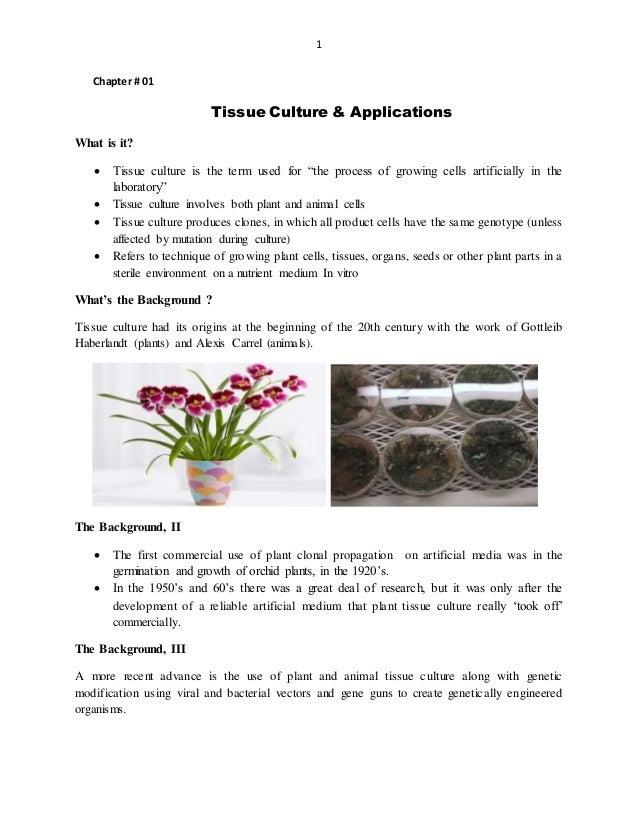
To conserve rare or endangered plant species. Plant Tissue Culture and Its Agricultural Applications presents the proceedings of the 41st University of Nottingham Easter School in Agricultural Science held in England.

Plant Tissue Culture and Its Agricultural Applications presents the proceedings of the 41st University of Nottingham Easter School in Agricultural Science held in England.
What is plant tissue culture and its applications. Plant Tissue Culture and Its Applications By. Plant tissue culture has come as a good tool in plant biotechnology allowing for highly controlled system for. The plasticity of plants and their totipotency nature allows whole plants to be regenerated from any part.
Plant tissue culture. Growing the plant cells tissues and organs on a artificial synthetic medium under controlled conditions is called plant tissue cultures. Plant tissue culture has become a major thrust area in plant biotechnology.
The basic concept of plant tissue cultures is totipotency differentiation dedifferentiation and redifferentiation. Plant tissue culture is a collection of techniques used to sustain or grow plant cells tissues or organs under sterile conditions on a nutrient culture medium of known composition. Plant tissue culture is used to produce clones of plant in a method called micopropagation.
Plant tissue culture relies on the fact that many plant cells have the ability to regenerate into a whole plant in a. The following points highlight the top ten applications of plant cell and tissue culture. Clonal Propagation and Micro-Propagation 2.
Somatic Embryogenesis and Synthetic Seed 6. Plant tissue culture is used widely in the plant sciences forestry and in horticulture. The commercial production of plants used as potting landscape and florist subjects which uses meristem and shoot culture to produce large numbers of identical individuals.
To conserve rare or endangered plant species. The five applications of the tissue culture are. 1 Rapid Clonal Propagation 2 Soma-clonal Variation 3 Transgenic Plants 4 Induction and Selection of Mutations and 5 Resistance to Weedicides.
Plant tissue culture is applied in the area of plant physiological and biochemical research to study the cell cycle metabolism in cells nutritional morphogenetical and developmental studies in plants. Plant Tissue Culture and Its Bio-technological Application Proceedings of the First International Congress on Medicinal Plant Research Section B held at. Plant tissue culture PTC is one among the group of biotechnological methods utilizing in vitro strategies and techniques to culture living plant cells under controlled conditions.
The technique is highly dynamic and could be varied to suit the particular type of cell culture aim and objective of the work. It has certain limitations too that is not all plants could be grown. Plant Tissue Culture and Its Agricultural Applications presents the proceedings of the 41st University of Nottingham Easter School in Agricultural Science held in England.
The sessions covered in this volume reflect the revolution of tissue culture and its role in the propagation of elite plant material and the development of improved genotypes. This book is organized into four main sections. The first section chronicles the revolution of the plant tissue culture.
Tissue culture techniques have been applied commercially to horticultural species including orchids and gerbera while in agriculture and speciality crops major success has been achieved with oil palm jojoba and citrus. Key targets in agriculture include cereal crops such as maize and wheat. Plant tissue culture is a key facilitator component in genetic transformations using Agrobacterium tumefaciens elec-troporation and particle bombardment.
Plant Tissue Culture Technique and its applications 1. TISSUE CULTURE AS A PLANT PRODUCTION TECHNIQUE FOR HORTICULTURE CROPS 2. WHAT IS TISSUE CULTURE.
Tissue culture is the term used for the process of growing cells artificially in the laboratory. PLANT TISSUE CULTURE-Technique of growing plant cells tissues and organs in an artificially prepared nutrient. Plant Tissue Culture and Its Agricultural Applications presents the proceedings of the 41st University of Nottingham Easter School in Agricultural Science held in England.
The sessions covered in this volume reflect the revolution of tissue culture and its role in the propagation of elite plant material and the development of improved genotypes. This book is organized into four main sections. Tissue culture a method of biological research in which fragments of tissue from an animal or plant are transferred to an artificial environment in which they can continue to survive and function.
The cultured tissue may consist of a single cell a population of cells or a whole or part of an.